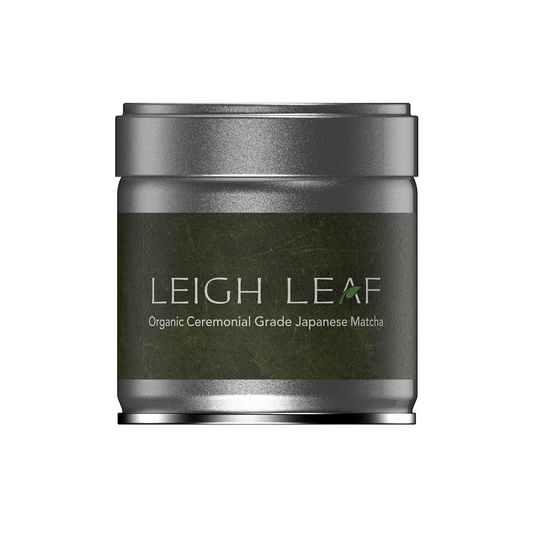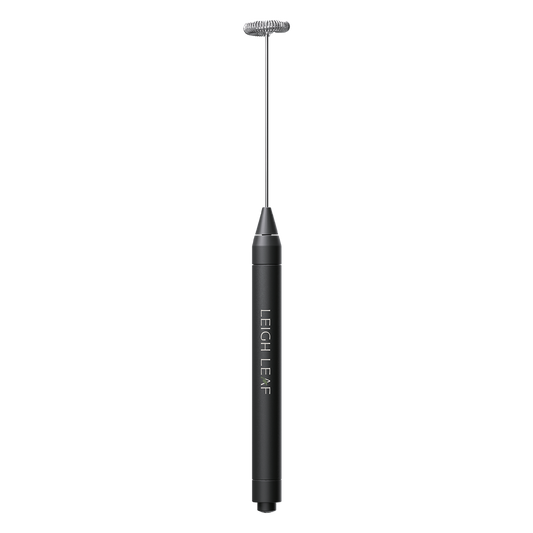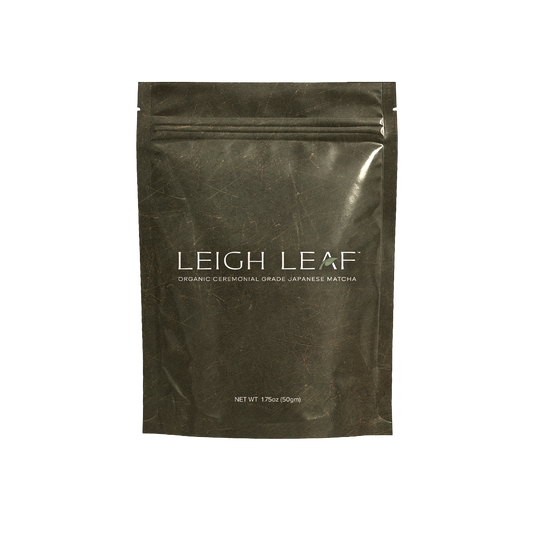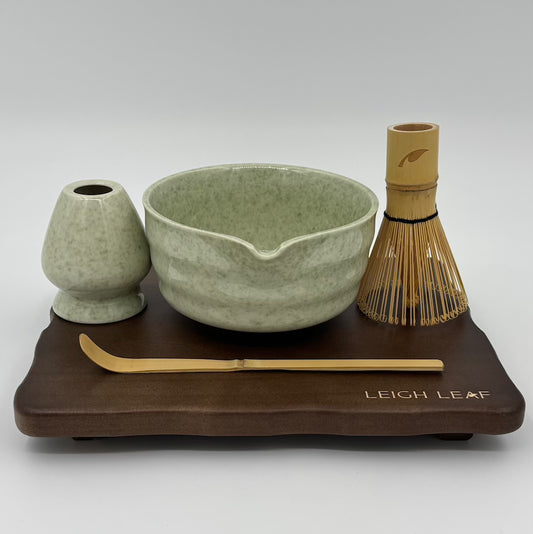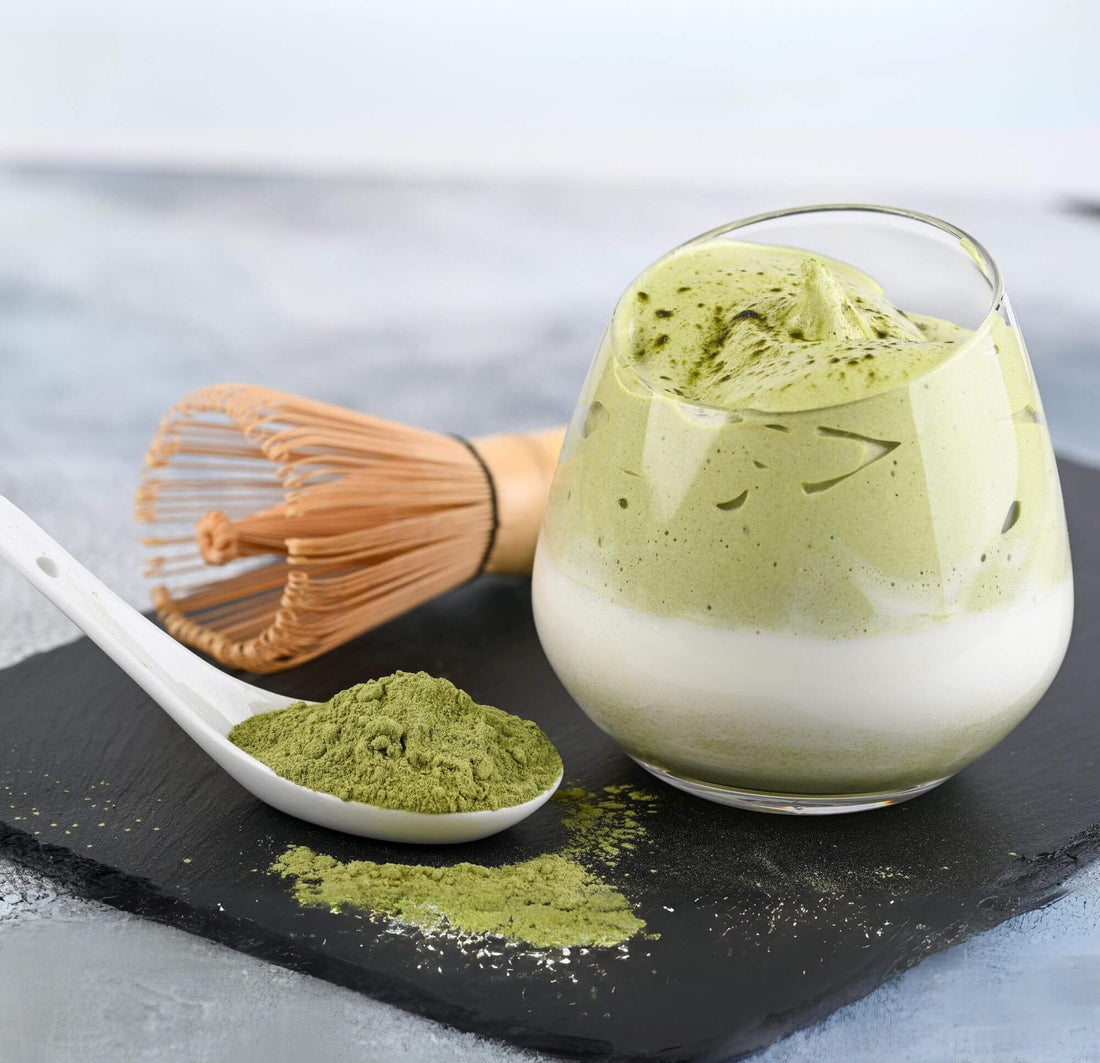
How Much Caffeine Is in A Matcha Latte?
Share
Do you enjoy matcha lattes? The vibrant green hue, the earthy aroma, and that delightful frothy texture can make anyone's day a little brighter. But have you ever wondered what makes this beverage so energy-boosting? The answer lies in a little compound called caffeine.
Table of content
What Is Matcha?
Before we delve into the caffeine content of matcha latte, let's start at the beginning: What exactly is matcha?
Matcha: The Green Elixir
Matcha is a special type of powdered green tea that has its roots deeply embedded in Japanese culture. Matcha is created by grinding green tea leaves into a fine powder, as opposed to making traditional green teas by steeping leaves. This powder is then whisked into hot water or milk, creating a vibrant green beverage with a unique flavor profile that's both earthy and slightly sweet.

Ceremonial vs. Culinary Matcha
Matcha comes in two main grades: ceremonial and culinary. Traditional Japanese tea ceremonies often use ceremonial matcha, which is of the highest quality. The taste is delicate and slightly sweet, and it has a vibrant green color. As opposed to culinary matcha, which is used in cooking and baking, culinary matcha has a more robust flavor.
How Much Caffeine Does Matcha Have?
Now that we've acquainted each other with matcha, let's move on to the star of the show: caffeine.
The Caffeine Connection
Yes, caffeine is in a matcha latte. In fact, matcha contains caffeine naturally, just like coffee and other types of tea. Matcha's caffeine content varies depending on several factors, including its grade and how it is prepared. On average,though, a single teaspoon of matcha powder (about 2 grams) can contain anywhere from 30 to 70 milligrams of caffeine.
Caffeine in Ceremonial vs. Culinary Matcha
The caffeine content in ceremonial grade matcha tends to be on the lower end of the spectrum, typically around 30 to 40 milligrams per teaspoon. This makes sense, as ceremonial matcha is known for its smooth and mellow flavor, and excessive caffeine would not be conducive to a serene tea ceremony.
On the other hand, culinary matcha can have a higher caffeine content, ranging from 50 to 70 milligrams per teaspoon. This is because culinary matcha is often used in recipes where the bold flavor can shine through, and the extra caffeine kick might be welcomed.
Does Matcha Have More Caffeine Than Coffee?
Now, let's tackle a common misconception: Does matcha have more caffeine than coffee?
The Surprising Answer
Believe it or not, matcha does contain caffeine, but it generally has less caffeine than your typical cup of coffee. To put things into perspective, a standard cup of coffee contains approximately 95 milligrams of caffeine on average, while a teaspoon of matcha powder contains around 30 to 70 milligrams, as mentioned earlier.
The Power of L-Theanine
But here's where matcha has a unique advantage: it contains an amino acid called L-theanine. L-theanine is known for its calming effects, which can help counteract the jittery sensation that some people experience from caffeine. The synergy between caffeine and L-theanine in matcha results in a more sustained and focused energy boost compared to coffee's rapid spike and crash.
As a result, matcha provides a smoother and longer-lasting energy boost without the jitters associated with coffee.
The Matcha Tea vs. Matcha Latte Dilemma
When you enjoy a traditional cup of matcha tea, you're consuming pure matcha powder whisked with hot water. In this form, matcha has a higher caffeine concentration because there are no other ingredients to dilute it. A standard cup of matcha tea typically contains about 30 to 70 milligrams of caffeine, just like a matcha latte.
However, when you turn that matcha tea into a matcha latte by adding milk, the overall caffeine content may vary. It depends on the ratio of matcha to milk and how you prepare it. If you use more milk and less matcha, your latte might have less caffeine than a standard cup of matcha tea. If you want to know more about Matcha, visit Leigh Leaf.
Personalization Is Key
The beauty of making your own matcha latte is that you can adjust the ingredients to suit your taste and energy needs. If you prefer a milder caffeine kick, simply add more milk. Conversely, if you're looking for a more robust energy boost, use a bit more matcha powder.
How Does This Compare to Coffee?
Now, let's dive into the caffeine face-off: matcha latte vs. coffee.
The Battle of the Brews
Coffee is renowned for its caffeine content and its ability to jolt you awake in the morning. The caffeine content of a matcha latte is significantly lower than that of a cup of coffee. So, if you're seeking a quick and powerful energy surge, coffee might be your go-to choice.
The Quality of Energy
The type of energy you require should be taken into account, though. Coffee can give you a quick boost of energy, but it frequently comes with the dreaded coffee crash. Caffeine in coffee can increase heart rate, anxiety, and restlessness in some people.
On the other hand, matcha's caffeine, paired with L-theanine, delivers a more sustained and focused form of energy. It provides mental clarity without the jitters, making it an excellent choice for those who want to stay energized throughout the day.
The Flavor Factor
Let's not forget about flavor. Matcha lattes have a unique, earthy taste that's quite different from the bold, bitter profile of coffee. It's all a matter of personal preference. Some people adore the soothing, slightly sweet notes of matcha, while others can't live without their daily coffee fix.
How Can You Buy Matcha Online?
It's essential to discover the top matcha online, and choosing from reputable brands like Leigh Leaf guarantees a delightful matcha experience. Our Ceremonial Grade matcha meets rigorous quality standards, delivering exceptional organic matcha powder. Indulge in the goodness of organic matcha tea with our Matcha powder.
The Bottom Line
In conclusion, caffeine is indeed present in a matcha latte, albeit in varying amounts depending on factors such as the grade of matcha and how it's prepared. While matcha contains less caffeine than coffee on average, it offers a smoother and more sustained energy boost thanks to the presence of L-theanine.
When comparing a matcha latte to regular matcha tea, the caffeine content can be similar, but it's entirely customizable based on your preferences. Add more milk for a milder kick or more matcha for a stronger one.
As for the matcha latte vs. coffee showdown, it ultimately comes down to your taste and the kind of energy you desire. Coffee delivers a quick punch of caffeine, while matcha provides a gentler, longer-lasting lift.
For additional inquiries regarding matcha, explore the Leigh Leaf blog section for further insights. Alternatively, you can contact our expert support team through our contact form for personalized assistance.

